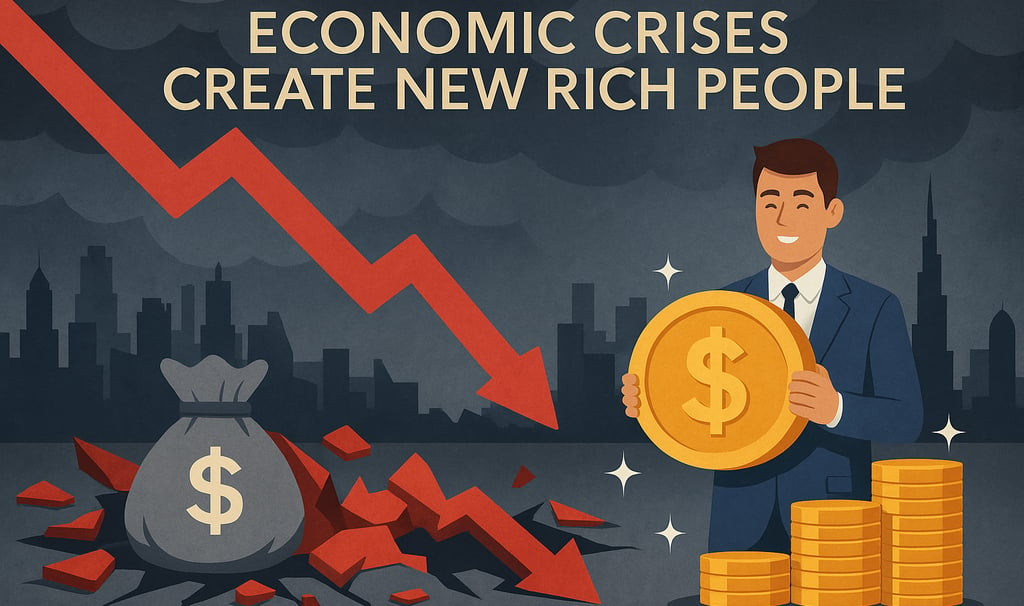How Economic Crises Create New Rich People: The Surprising Truth
10/20/20254 min read


Understanding Economic Crises
An economic crisis is characterized as a significant disturbance in the economy that leads to widespread financial turmoil. It can manifest in various forms, including recessions, depressions, market crashes, or even systemic failures triggered by external shocks. The defining traits of an economic crisis typically include a sharp decline in economic activity, skyrocketing unemployment rates, bankruptcies, and a loss of consumer and business confidence. These crises can emerge from numerous causes, including but not limited to, excessive speculation in financial markets, poor economic policies, or unforeseen events such as natural disasters and pandemics.
Recessions are perhaps the most recognized types of economic downturns, marked by two consecutive quarters of negative GDP growth. For instance, the Great Recession from 2007 to 2009 resulted from the collapse of the housing bubble and led to catastrophic impacts worldwide. Market crashes, such as the stock market crash of 1929, are severe downturns that often prompt panic selling and further exacerbate economic woes. External shocks, like the COVID-19 pandemic, exemplify how unpredictable events can disrupt global supply chains and consumer behavior, resulting in widespread economic contractions.
The aftermath of economic crises usually includes contractionary monitory policy responses, increased government interventions, and long-term changes in consumer behavior. These effects can create both challenges and opportunities for entrepreneurs and investors. Historically, downturns have given rise to new business models and wealth creation, as those who adapt quickly to the changed landscape can capitalize on emerging needs and opportunities. For example, during the Great Recession, sectors such as technology and renewable energy experienced significant growth, paving the way for new 'rich people' by enabling them to seize these opportunities amid adversity.
The Opportunities in Adversity: How Economic Downturns Create Wealth
Economic downturns, often viewed as periods of difficulty and struggle, paradoxically serve as fertile ground for the emergence of new wealthy individuals. During such times, the principle of 'buying low' becomes particularly relevant, providing strategic investment opportunities for those who are prepared to act. When asset prices decline, savvy investors can acquire properties, stocks, and businesses at significantly lower costs, positioning themselves for substantial gains when the economy rebounds.
Moreover, economic crises frequently inspire innovation, motivating entrepreneurs to pivot their business models or explore entirely new ventures. The environment of adversity pushes individuals to identify unmet needs in the market, thus fostering creativity. For example, during the 2008 financial crisis, many tech startups, including Airbnb and Uber, emerged as cost-effective alternatives to traditional services, illustrating how adversity can spur entrepreneurial activity. These companies capitalized on the changing landscape and consumer preferences, ultimately becoming leaders in their respective industries.
Additionally, the reduced competition during economic downturns can create a unique landscape where agile businesses gain a competitive edge. As larger corporations struggle or cut back on operations, smaller companies can snatch up market share by offering innovative solutions and exceptional customer service. This environment has historically allowed many new entrepreneurs to thrive despite the economic climate, often resulting in their ascension to wealth and influence.
Key influencers, such as Warren Buffett, have famously stated that the best time to invest is when others are fearful, emphasizing the notion that economic crises can yield valuable opportunities for those willing to take calculated risks. This mindset not only fosters resilience but also encourages a proactive approach to wealth creation, underscoring how even in times of adversity, potential for financial success exists for those who are ready to seize it.
Investing Smartly During Economic Crises: Strategies for Success
Economic crises, while challenging, often present unique opportunities for wealth building. Individuals who approach these economic downturns with a strategic mindset can identify lucrative avenues for investment. One effective strategy involves diversifying investment portfolios to include various asset classes, such as stocks, real estate, cryptocurrencies, and startups. Each option offers distinct benefits and risks, making thorough research essential to mitigate potential losses.
Investing in stocks during an economic crisis can yield substantial returns, especially if one targets undervalued companies poised for recovery. Market volatility often leads to sharp declines in stock prices, creating opportunities for savvy investors to acquire shares at discounted rates. Analyzing financial statements, market trends, and company stability can guide informed decisions on which stocks to pursue.
Real estate also presents a compelling investment avenue during economic downturns. With lower property valuations, investors can acquire assets that may appreciate significantly over time. Identifying properties in areas with growth potential can enhance long-term returns. Moreover, rental income can provide cash flow stability, even during fluctuating market conditions.
Cryptocurrencies have gained popularity as alternative investments during crises. While they can be highly volatile, investing in established cryptocurrencies may offer diversification benefits. Utilizing platforms such as https://www.okx.com/ can facilitate secure trading and provide access to a range of digital assets. However, thorough research is critical to navigate the complexities of cryptocurrency investments effectively.
Finally, investing in startups during economic downturns can yield impressive rewards. Startups often pivot and innovate during challenging times, leading to significant growth once the economy rebounds. Engaging with reputable online resources, such as GO AI-ACADEMY, can enhance understanding of startup ecosystems and inform investment decisions. By leveraging comprehensive research and employing critical thinking, investors can capitalize on the unique opportunities that arise during economic crises.
Lessons Learned: How to Prepare for Future Economic Challenges
Preparing for future economic challenges necessitates a proactive approach to financial resilience, requiring individuals to take intentional steps aimed at safeguarding their financial well-being. One of the first steps in this regard is to establish a comprehensive financial plan. A well-thought-out financial strategy not only helps in identifying current assets and liabilities but also assists in setting achievable long-term goals. Evaluating expenditure and savings regularly ensures that one remains aligned with these financial goals, allowing a clearer assessment of progress over time.
Diversifying income sources plays a critical role in mitigating the risks associated with economic downturns. Relying solely on a single source of income can be precarious. Individuals are encouraged to explore options such as freelance work, investments, and passive income streams that can provide a safety net during tough economic times. This diversification enhances financial stability and alleviates the pressure to depend exclusively on a single job or investment for sustenance.
Additionally, enhancing financial literacy is vital for effectively navigating economic fluctuations. Understanding market cycles and the principles of supply and demand empowers individuals to make informed decisions during crises. Regularly engaging with financial news, taking relevant courses, and consulting with financial advisors can help in cultivating a more profound knowledge of fiscal matters. This knowledge not only prepares individuals to brace for downturns but also positions them to identify potential opportunities amidst economic turmoil.
In summary, preparing for future economic challenges involves a multifaceted approach centered around financial planning, income diversification, and ongoing education. Embracing change and being proactive rather than reactive in one's financial strategies is essential in order to thrive in an unpredictable economic landscape. By equipping oneself with the right tools and knowledge, it becomes possible to weather the storm during crises and emerge stronger and more secure.
EconoTrade Insights
Learn. Trade. Grow.
Empowering financial freedom through smart education and trusted tools.
© 2025 ECONO TRADE INSIGHTS. All rights reserved.
About - https://econotradeinsights.com/about-us-financial-blogging
Contact - econotradeinsights@gmail.com
Disclaimer - https://econotradeinsights.com/disclaimer
Terms & Conditions - https://econotradeinsights.com/terms-and-conditions
